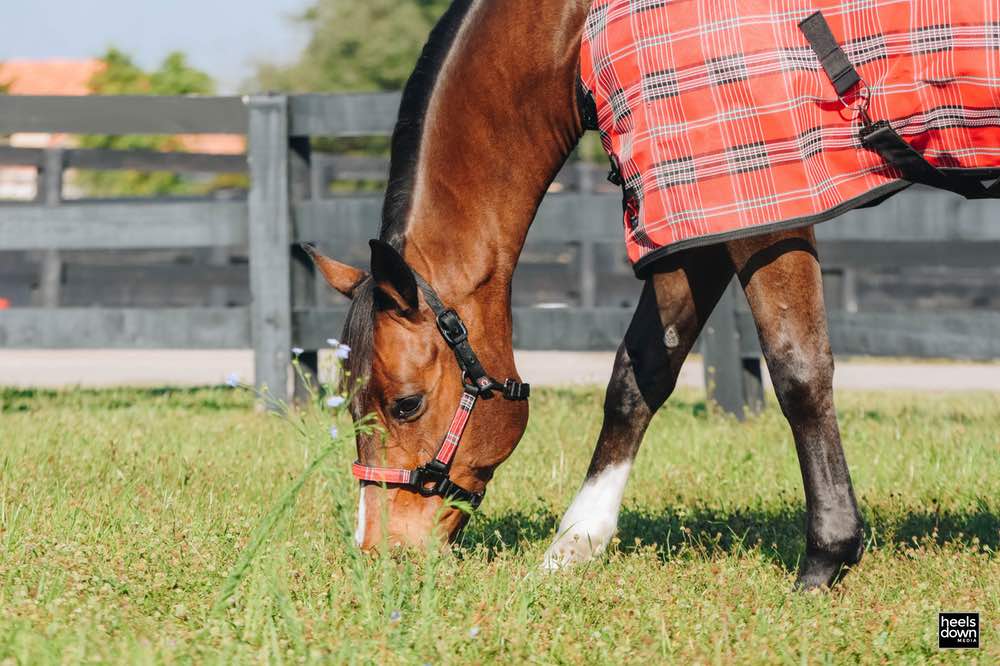Are We Over-Treating Our Horses For Ulcers?

Is your horse girthy? Is he irritable or uncomfortable when groomed? Is he resistant to leg pressure? Kicking out under saddle? Or experiencing mild, colic-like symptoms fairly frequently?
If you answered “yes” to the questions above, the Internet will tell you your horse has ulcers. So will dozens of horse people on Facebook, whether or not you ask for their opinion.
But horse health practitioners fear horse owners could be over-doing it with ulcer treatments. And if that’s the case, it could lead to some serious consequences.
“We’re hearing a lot more about ulcers, that’s for sure. I don’t know if the incidents are higher in horses than before, or if it’s because we’ve figured out what the symptoms are and we’re looking for it more and more,” explained Kathleen Crandell, an equine nutritionist with Kentucky Equine Research.
Like This Story? Try: Does Your Horse Enjoy Its Job?
It’s not uncommon for horse owners to skip the call to the vet (and the cost for the scoping needed to confirm a case of gastric ulcers) and treat horses for this ailment on their own, without a professional to guide them. Sometimes they are using short-term medications for long-term treatment.
“A lot of people just treat horses anyway as a way to prevent problems,”
Kathleen described. “I understand that philosophy. But you have to think about what stomach acid does – it helps break down food and starts the production of digestion. It’s going to affect digestion in some way over the long-term, if a horse is constantly being treated. It’s changing the natural environment in the stomach.”
Treating ulcers and maintaining a healthy gut in horses is no walk in the park. And ulcers are quite common in horses. Up to 90% of racehorses and 60% of show horses are affected by equine gastric ulcers, according to the American Association of Equine Practitioners. There are dozens of supplements and treatments on the shelves marketed toward ulcers and maintaining healthy guts, but not every product is created equal.
It’s going to affect digestion in some way over the long-term, if a horse is constantly being treated. It’s changing the natural environment in the stomach.
Horses are grazing animals and are built to be doing just that – grazing – nearly all hours of the day. So by restricting them to stalls and providing a grain-based diet only twice-to-three times a day can contribute to ulcers,
Kathleen said. Stress, like traveling to and from horse shows, can also lead to gastric issues.
Omeprazole (found in products like UlcerGuard and GastroGuard) is the only medication approved to treat and heal stomach ulcers in horses. It is a proven inhibitor of acid secretion in horses, which allows the gut time to heal the sores in the stomach, or near the colon and hindgut.

“We don’t have as much research on hindgut ulcers, but we’re seeing instances in horses that eat a lot of grain, it overwhelms the digestive capacity, so grain is getting into the colon,” Kathleen explained. “When that happens, the bacteria there loves to digest grain, but it’s lacking the acid that’s produced in the stomach to really digest it. Spring pasture, when the lush grass can be high in sugar, can also lead to changes in pH in the gut.”
Read This Next: Happy Horses – The Importance Of Routine
Diet also plays a major role in preventing ulcers. Free choice hay and grains with low sugar and starch are easier for horses to digest. Alfalfa, a protein- and calcium-rich forage, also helps line the horse’s stomach and acts as a natural buffer.
Several supplements, fed daily as a top dressing in a horse’s feed, can help ease the painful and irritable symptoms of ulcers. Common and effective ingredients include calcium (and calcium carbonate – the ingredient found in TUMS), sucralfate and milk of magnesia. Some herbal-based products claim to aid in digestion, but horse owners should do their research before selecting and administering a product that’s right for their horse, Kathleen said.
“Keep in mind that the only thing to cure ulcers is omeprazole medication,” Kathleen said. “Some people may try to save money buying over-the-counter (human) products, but that doesn’t always work. They’re better off just getting the omeprazole to treat it.”
Kathleen is referring to Ranitidine, or drugs found in pharmacy stores like Zantac or Nexium, which owners have used in horses (just with higher dosages from human-grade pills).
“We can affect the environment of the stomach and all the way down to the hindgut just by playing with different things,” Kathleen reiterated. “For example, feeding a prebiotic could just be feeding the bacteria in the gut that’s already producing ulcers, and lead to more in the stomach.”
To learn more about ulcers and the science behind them from Kentucky Equine Research, click here.


